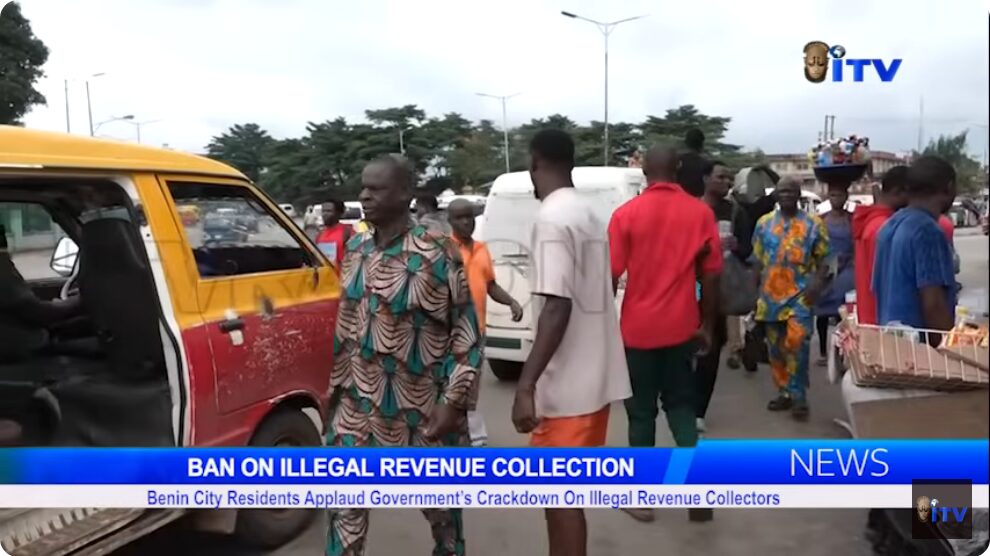Benin City, Edo State — In streets, markets, motor parks and road junctions across Benin City, residents have begun whispering of relief and renewal. The Edo State government’s recent decisive action against illegal revenue collectors has earned broad public support, as traders, transport operators and ordinary citizens praise a move long overdue.
Government Takes a Firm Stand
On August 5, 2025, the Edo State Government, through a press release signed by Secretary to the State Government, Umar Musa Ikhilor, announced an indefinite ban on revenue collection by certain transport unions and private firms.
According to the statement, these groups — including the National Union of Road Transport Workers (NURTW), Road Transport Employers Association of Nigeria (RTEAN), ANNEWAT, Drivers on Wheel, and a consultant firm Atalakpa Recovery Concept Ltd — had been permitted to assist the Edo State Internal Revenue Service (EIRS) under supervised terms. But over time, they allegedly deviated from their assigned roles, resorting to extortion, harassment, and cash collections outside the authorized cashless revenue system.
The government described their conduct as “economic sabotage,” a breach of public trust, and a social menace. All demands for levies, dues or charges from these bodies now stand void and illegal. Citizens are expressly warned not to comply with any such demands, and instructed to report violations to the Edo State Special Taskforce (coordinated by SP Michael Anetor at 08038157126).
Enforcement: Arrests, Police Support & Public Warnings
Within 24 hours of the ban, the Edo State Task Force rounded up over 10 individuals implicated in illicit levies on market women, drivers, traders and other road users at locations such as Oka Market, Ring Road, Airport Road, and Upper Sakponba.
The State Police Command quickly pledged full cooperation, promising enforcement and prosecution of offenders to the fullest extent of the law.
Critics and supporters alike note that this decisive action signals political will. But many stress that the success of the move hinges on sustained follow-through — not just arrests, but effective prosecution, consistent vigilance and systemic reforms.
Some observers also point out the need for a transparent, technology-driven, cashless revenue system that minimizes human discretion and limits opportunities for extortion.
Voices from the Streets: Relief, Hope — and a Dose of Skepticism
Across Benin City, many residents have welcomed the crackdown with open arms.
-
In Oka Market, traders reportedly cheered when enforcement teams intercepted illegal collectors.
-
Market women have expressed relief at reduced harassment and uncertainty.
-
Commercial drivers and transport unions, long burdened by multiple “levies” at checkpoints, say they now feel freer to ply their trade without arbitrary charges.
One driver was quoted saying, “For too long we paid what we were told by unauthorized people. Now, maybe we’ll breathe easier.” (Paraphrased from local reportage.)
Yet, among the optimism lies a cautionary note. Several voices warn that unless the enforcement remains persistent, the same practices may reappear under new names or via proxies. Some residents recalled past crackdowns that fizzled, leaving them vulnerable again.
Others call on the government to publish names of prosecuted offenders, set up a transparent complaints mechanism, and regularly update the public on progress.
Stakes & Challenges Ahead
1. Institutionalizing the Gains
This crackdown can’t be a one-off headline. It must feed into a permanent reform of Edo’s revenue architecture, privileging traceable electronic payments, audit trails, and clear accountability.
2. Prosecution & Deterrence
Arrests alone won’t suffice unless followed by fair, timely adjudication. A zero-tolerance posture must include blacklisting of errant organizations and individuals.
3. Public Engagement & Awareness
Citizens must be empowered to refuse illegal levies, report infractions without fear, and access updates on enforcement. A sustained public outreach campaign is essential.
4. Preventing Backlash or Resistance
Those who lose illicit revenue may resist. The government must be prepared to manage tensions, political pressure, or covert resurgence of collection networks.
Conclusion
Edo State’s crackdown on illegal revenue collectors in Benin City is being hailed by residents as a necessary correction to decades of unchecked extortion. The swift arrests and backing by police have bolstered optimism. But the real test lies ahead: can the government sustain the momentum, embed reforms, and ensure that the people’s relief does not fade into routine again?
If this succeeds, Benin City may become a model of how to reclaim streets, markets and motor parks from the grip of unauthorized revenue rackets — and restore dignity to everyday commerce in Nigeria.


Leave a Reply